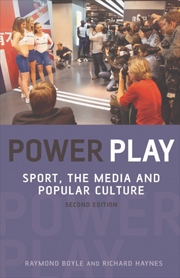Book contents
- Frontmatter
- Contents
- Miscellaneous Frontmatter
- Preface
- Acknowledgements
- 1 Sport, the Media and Popular Culture
- 2 All Our Yesterdays: A History of Media Sport
- 3 A Sporting Triangle: Television, Sport and Sponsorship
- 4 Power Game: Why Sport Matters to Television
- 5 Who Wants to Be a Millionaire? Media Sport and Stardom
- 6 The Race Game: Media Sport, Race and Ethnicity
- 7 Playing the Game: Media Sport and Gender
- 8 Games Across Frontiers: Mediated Sport and National Identity
- 9 The Sports Pages: Journalism and Sport
- 10 Consuming Sport: Fans, Fandom and the Audience
- 11 Conclusion: Sport in the Digital Age
- Bibliography
- Index
Preface
Published online by Cambridge University Press: 05 August 2013
- Frontmatter
- Contents
- Miscellaneous Frontmatter
- Preface
- Acknowledgements
- 1 Sport, the Media and Popular Culture
- 2 All Our Yesterdays: A History of Media Sport
- 3 A Sporting Triangle: Television, Sport and Sponsorship
- 4 Power Game: Why Sport Matters to Television
- 5 Who Wants to Be a Millionaire? Media Sport and Stardom
- 6 The Race Game: Media Sport, Race and Ethnicity
- 7 Playing the Game: Media Sport and Gender
- 8 Games Across Frontiers: Mediated Sport and National Identity
- 9 The Sports Pages: Journalism and Sport
- 10 Consuming Sport: Fans, Fandom and the Audience
- 11 Conclusion: Sport in the Digital Age
- Bibliography
- Index
Summary
THE MEANING BEHIND THE SPECTACLE:
Giant scrolls? Human kites? An army of drummers? Clifford Coonan decodes the symbols of the ceremony China used to tell its story to the world.
(The Independent, commenting on the opening ceremony of the Beijing Olympic Games, 9 August 2008)A decade of change: media sport 2000–8
The increasingly central role that sport plays in public life was clearly evident in the UK during August 2008. In the light of Team GB's Olympic success, sporting media stories were everywhere, and significantly often in mainstream broadcast, print and online news coverage. At these moments the already increasingly porous boundaries between sports news and news news disappear completely.
Sports such as cycling, not normally given an extensive media profile, found itself and its stars, such as triple gold medal winner Chris Hoy, being centre stage in the media spotlight (‘Golden Hoy: the Scot who made Olympic History’, the front page splash in The Herald, 20 August 2008). There were numerous news stories that focused on the politics of sport. These included the debate about whether Team GB should have an all British football team at the 2012 London Olympics. The Prime Minister at Westminster Gordon Brown, a Scot, having given much political thought to defining ‘Britishness’, advocated such a move. He clashed with Alex Salmond, First Minister and leader of the Scottish National Party government in Edinburgh, who argued against such an arrangement, going further to suggest that Scotland should have its own distinct team at the Olympics.
- Type
- Chapter
- Information
- Power PlaySport, the Media and Popular Culture, pp. v - ixPublisher: Edinburgh University PressPrint publication year: 2009



